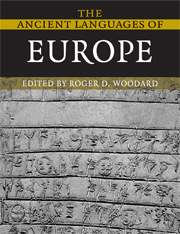Book contents
- Frontmatter
- Contents
- List of figures
- List of tables
- List of maps
- List of contributors
- Notes on numbering and cross-referencing
- List of abbreviations
- Preface
- Preface to the first edition
- 1 Language in ancient Europe: an introduction
- 2 Attic Greek
- 3 Greek dialects
- 4 Latin
- 5 Sabellian languages
- 6 Venetic
- 7 Etruscan
- 8 Continental Celtic
- 9 Gothic
- 10 Ancient Nordic
- Appendix 1 Indo-European
- Appendix 2 Full tables of contents from The Cambridge Encyclopedia of the World's Ancient Languages, and from the other volumes in the paperback series
- Index of general subjects
- Index of grammar and linguistics
- Index of languages
- Index of named linguistic laws and principles
7 - Etruscan
Published online by Cambridge University Press: 01 September 2010
- Frontmatter
- Contents
- List of figures
- List of tables
- List of maps
- List of contributors
- Notes on numbering and cross-referencing
- List of abbreviations
- Preface
- Preface to the first edition
- 1 Language in ancient Europe: an introduction
- 2 Attic Greek
- 3 Greek dialects
- 4 Latin
- 5 Sabellian languages
- 6 Venetic
- 7 Etruscan
- 8 Continental Celtic
- 9 Gothic
- 10 Ancient Nordic
- Appendix 1 Indo-European
- Appendix 2 Full tables of contents from The Cambridge Encyclopedia of the World's Ancient Languages, and from the other volumes in the paperback series
- Index of general subjects
- Index of grammar and linguistics
- Index of languages
- Index of named linguistic laws and principles
Summary
HISTORICAL AND CULTURAL CONTEXTS
Etruscan, the language of the Etruscans, is attested between 700 BC and AD 50 in the area of northwest central Italy between the Arno, the Tiber, and the Tyrrhenian Sea. A few Etruscan texts come from other areas of Italy (especially from Campania and Emilia) and from Corsica, and isolated examples are known from Provence, Tunisia, Greece, and Egypt.
The most important source of Etruscan is the c. nine thousand inscriptions. The majority are funerary inscriptions, which often consist of no more than the name of the deceased. The second largest group is formed by the likewise mostly short texts on objects of daily life which indicate the owner or the manufacturer, or the object as a present or a dedication. Readily comprehensible are the labels inscribed next to figures in pictorial representations. The longer inscriptions are legal or ritual in character. The quasi-bilingual from Pyrgi (with a parallel text in Phoenician) reports the dedication of a cult building; the Perugine cippus records a contract about a piece of land; the clay tablet of Capua (which, with 300 preserved words, is the longest Etruscan inscription) preserves a ritual calendar; and the recently published (Agostiniani and Nicosia 2000) bronze tablet of Cortona seems to contain, as I think, a record of the treatment of tenant farmers after the sale of an estate rented by them.
- Type
- Chapter
- Information
- The Ancient Languages of Europe , pp. 141 - 164Publisher: Cambridge University PressPrint publication year: 2008
- 3
- Cited by



